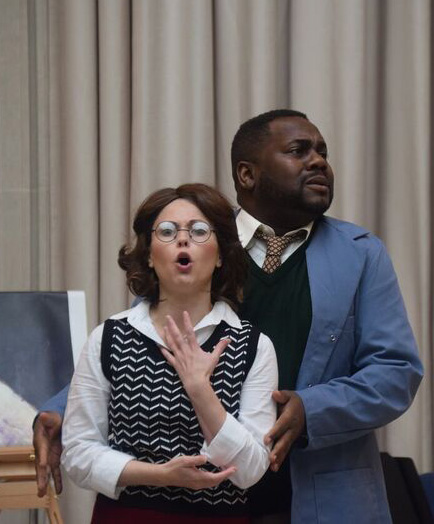Soprano provides compelling advocacy for Holocaust-themed “Letters from Ruth”

Alisa Jordheim and Kenneth Overton in “Letters from Ruth” at the National Gallery. Photo: Steve Hahn
“Despite everything, I believe that people are really good at heart.”
“The world is not evil. For if it was evil, then I ask you: How does the good come into the world?”
You’ve probably read the first quote. It’s from the diary of Anne Frank, a Dutch Jewish girl who spent World War II hiding in an annex inside an office building in Amsterdam.
The second quote, though, you probably haven’t seen before. That’s because it comes from the writings of Ruth Maier, an Austrian Jew who spent the war years as a young woman in hiding in Norway until she was deported to Auschwitz and murdered on arrival in 1942 at age 22.
Considered a counterpart to Frank and lauded by Norwegian poet Jan Erik Vold as having a literary talent on par with Susan Sontag and Hannah Arendt, Maier’s diaries were finally published in 2007. Now, she’s the subject of a work of stirring musical theatre that premiered in 2015, selections from which were presented Sunday at the National Gallery of Art.
Straddling opera and musical theatre, Letters from Ruth, with music by Gisle Kverndokk and text drawn from Maier’s diaries by the composer and Aksel-Otto Bull, is a moving chamber piece that traces Maier’s life from her youth in Vienna to her time in Norway and eventual arrest. Attentively presented with impressive cohesion by a cast that had first rehearsed together only two days before Sunday, the afternoon proved consistently compelling in its score and its dramatic objectives.
Kverndokk’s score lacks the stylistic cohesion that characterizes opera and often careens abruptly through a variety of musical genres, including swing, chant, waltz, and contemporary popular music. Yet the performance flowed with intensity. The dissonance of global and internal conflict lived beside the rich harmonies of aspirations and the four-person ensemble (violin, cello, clarinet, and piano). In a controlled rendition, conductor Andrew Rosenblum delicately spun out the arched, swirling harmonies so reminiscent of Stephen Sondheim that accompanied much of the vocal writing.
Some moments of the vocal writing (crowd scenes and orchestral interludes) are more effective than others. Ironically, the set recitations of Maier’s poems were often lost to the crushing roar of seven singers singing full-out in the West Garden Court’s cavernous acoustics.
Yet Kverndokk and Bull have crafted a gratifying lead role and, more importantly, revealed a complex heroine in Maier, especially as performed by Alisa Jordheim.
Singing with steely earnestness and a gorgeous, vintage musical theater high belt when needed, Jordheim was a strikingly confident Ruth. With a soft-grained voice she can turn both mournful and wistful. She also showed innate sensitivity as an actress with a winning portrayal.
She was well supported by the entire cast. The rich-voiced mezzo Helen Karloski provided a nice counterpoint to Jordheim’s flute-like soprano in the pivotal role of Norwegian poet Gunvor Hofmo, Maier’s soulmate and paramour that she meets in Norway. It was Hofmo who preserved Maier’s diaries after her deportation and, in her reflections, she serves as the engine for the story again here.
Also notable were the fragile-voiced Molly Allen as Ruth’s sister, Judith, and the clarion tenor of John Tiranno as, among other parts, Herman Thimig, the actor Ruth briefly fixates upon. Kenneth Overton was an animated Gustav Vigeland, the artist who uses Ruth as a model for his sculpture Surprised, which can still be seen in Oslo’s Frogner Park. Only Shannon Devine fell short, singing at a relentless forte throughout. Raquel Barbieri Vidal directed the simple production with clarity and resourcefulness.
This continuous performance of excerpts sometimes provoked more questions than it answered; was Maier’s Jewish religion integral or incidental to her identity? What really was the nature of her relationship with Hofmo? Are there still other writers, thinkers, and artists were lost to the Holocaust that we have yet to hear from through their writings and art that survived?
A complete performance of Letters from Ruth can answer some of these questions and one hopes that local audiences have a chance to hear one soon.

Posted Sep 10, 2022 at 10:11 am by DR ROSE BUTLER,ESQ.
DID YOUR SOCIETY RECEIVE PERMISSION FROM THE HEIR OF THE ESTATE OF RUTH TO PERFORM THIS OPERA? RUTH WAS A REAL PERSON WITH A REAL CASTLE AND A REAL ESTATE.
REAL HEIRS